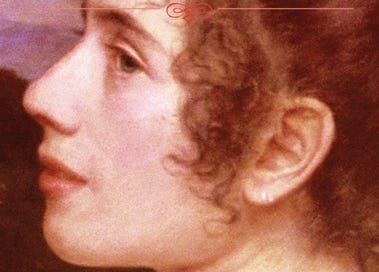Spoilers in this review: no spoilers if you already know the life of John the Baptist.
Did John the Baptist have a wife? Some historians suggest it would have been likely because of his age and his status as a Rabbi. Early on in the novel K Ford K uses the narrative to respond to readers questioning the wife's existence “A woman, in those days, was not counted. So even after we were married, people continued to say that John lived alone in the wilderness.”
I am always interested in stories written around biblical characters. Of necessity there are many gaps to be filled - whether of people, places or events. So to me, whether John might have married or not wasn't an issue. As soon as I read the story was a reimagining of the life of John the Baptist, and included the supernatural I was sold!
The narrator is Hessa, the only child of a rich Greek merchant, who has a psychic gift. Through touching an object or a person she gains insight into their experience. She can see the craftsmen who created the objects or cloth her father brings home from trips to other countries. She can read the thoughts of a trader in the market, or a visitor to the camp where she lives with John. This gift finds an echo in John, when he start to use his hands to baptise camp followers in the River Jordan.
Hessa is being lined up for a marriage that will strengthen her father's trading relationships. So her sudden and unauthorised marriage to a charismatic but itinerant Jewish preacher stuns and shatters the family.
This novel is rich in historical detail of the era in which is set, which lends a solidity and authenticity to the story. We smell the market place and the Temple, the River Jordan and the City of Salt where the Essenes live: "The market smelled like sour meat hanging in the sun, tangy olives, bread cooking over a flame, sweat, animal droppings, and above all, the powerful aroma of spices and oranges tinged with dust". We hear the "cacophony of different languages: Greek, Aramaic, and the colorful dialects of Egypt and Syria". The detail is woven into the story lightly, and does not slow down the flow of the narrative.
I have really enjoyed this story - it will go on my to-be-reread pile. The novel is short at 173 pages, but it felt the perfect length for this story. I felt deeply connected to John and Hessa and, even though I knew how John dies from the bible, the brutal imagining of his death and events immediately afterwards shocked me, and left me pretty emotional.
Do read: if you like a well-imagined historical novel with rounded characters and a good pace.
Don't read: if you're expecting a biblical story. Jesus is mentioned once.
I'd be honoured if you could help me to grow my readership. If you know others who like history or historical fiction please share this newsletter with them.




